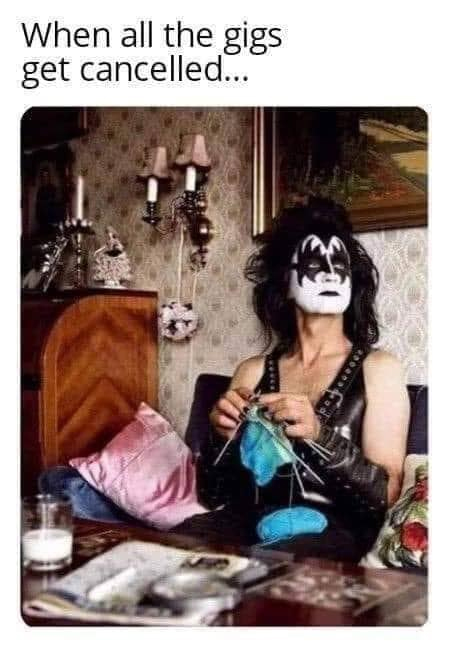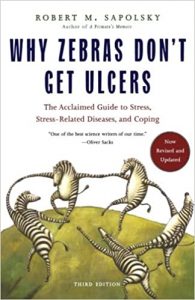
We are week two into isolation, living in a social distancing dystopia. Everything is strange. Our eating and sleeping habits, our daily routines, our physical workouts, and our work and school schedules and setups are all completely disrupted. It feels like we are living in wartime, and yet it’s Spring outside. The bombs are not dropping on our heads. The flowers are blooming… This disconnect between what we experienced based on our higher-function reasoning (as presented by newsmedia, social media, crazy conversations with friends and family) and what we sense directly through our eyes and ears is very difficult to reconcile. People are dying (they really are) and yet you can take an evening stroll outside and smell the flowers. Doctors are sharing horrific tales of shortages and insanity in their hospitals, and yet the birds are singing and the sun warms our skin. It feels crazy! This is emotional dissonance.
Mammals like us humans are not built for prolonged stress — it destroys our systems. We are “designed” for short bursts of adrenaline as a lion stalks us down the savanna. Worrying day after day is very destructive to our health.
For those who would like to read more about this, consider Dr. Sapolsky’s book, “Why Zebras Don’t Get Ulcers”.
You see, zebras are much less prone to stress-related diseases than us humans. A few moments of sheer terror, while being chased by a lion, resolve back down quickly into pastoral bliss. We are just not that lucky. Dr. Sapolsky is a professor at Stanford and is well worth a read (or a listen). Just search for his name on my blog to get all kinds of cool videos and other book reviews.
So most people I’m speaking to describe standard extreme stress symptoms: restlessness, sleep disturbances, poor or unusual appetite, inability to focus on mundane tasks, extreme lability (frequent and extreme changes in mood), constant rumination (chewing on the same thoughts over and over and over and over), and various levels of anxiety and paranoia. Sleep disturbances can manifest as insomnia — difficulty falling back to sleep or going to sleep in the first place — or bad dreams. People might experience unusual cravings for sweets, cravings for fat, aversion to food, or constant cravings. (Please note that loss of taste or smell is one of the first noticeable symptoms of COVID-19.) There is a high level of anxiety in the regular population now, but among those who are suspectable to it psychologically, it leads to full-blown clinical meltdowns. Many report going to bed with a slight sniffle or a cough and then spending the night in fear: “Is is allergies or do I have it?” In an uncontrolled pandemic, any symptom becomes a suspect.
I’m not immune. I have insane dreams — falling into the mouth of a giant snake and discovering strange and secret buildings and landscapes in New York City. I’m worried sick about my kids — did they accidentally touch the wrong doorknob? Did a sick person handle their food delivery package, turning the cardboard into the Corona Virus vector? I crave sweets all the time…and I’m losing weight. I haven’t been able to read a book in days. I compulsively read and watch the news. I was sick of politics before (full PTSD) but now it is all at another level. I’m not alone. As far as I know, everyone has similar reactions, regardless of their triggers.
And yet, we have to remember that we are lucky. We just have to STAY HOME to survive. There are people who will lose everything at the end of this pandemic…including lives. We lost many of our clients. I hope they will be able to roar back after everything returns to normal. But most won’t. I know at least half a dozen people going through chemotherapy — there is no worse time to get cancer than in the middle of a pandemic. I keep hoping…and yet I know that we will all lose people we know, people we care about it. But this is not like World War II, this is not like the Leningrad Blockade… Most of us will be okay. The world will be drastically different after this, but most of us will adjust and go on. We just have to hold our breath for a year…or a bit longer. The babies born this year will become part of a C Generation. Their childhood experiences will be radically shaped by what’s happening now. And college admissions teams for years will have to read thousands and thousands of essays on how this pandemic changed student applicants’ lives.
There are strategies to keep one’s sanity. Here’s what I’ve learned from personal experience (from previous life crises):
- Have a routine: Don’t drift in time. Get up at a regular time, eat on a schedule, exercise every day, work, study, be kind, be productive and creative…
- Exercise: Not only do our bodies need to move, but physical exhaustion helps with sleep. So find a way to do something to make your body tired. Run stairs, lift groceries, walk around the block, throw kids around…
- Eat regular meals: One of the downsides of working from home is working next to one’s kitchen. We all need to get up and stretch once in a while. But at home, those breaks tend to result in snacking — what else is there to do? At work, you might go off and talk to someone or get coffee. At home, you have that ice cream in the fridge. So find something else to occupy your breaks. Water one plant per break — give yourself reasons to get up more frequently. You don’t have to consolidate busywork into one marathon activity. Use small chores as fillers for what to do during a break in work or studying. You can write a book review…just saying!
- Cook from scratch: Yes, it’s easy to order from a restaurant. But it is also easy to order ingredients and learn how to make food for yourself and your loved ones. Restaurants can now deliver raw ingredients, so you would even be supporting your favorite businesses. Ask for recipes with a list of raw ingredients. Send back pictures of your creations to the restaurant! Cooking is a great way of expressing your creativity, and humans have an evolutionary history of bonding over food.
- Read: I know I said that I’m having problems reading, but I also managed to buy about a dozen books in the last week — it’s not hoarding if it’s books. I got a bunch of short stories anthologies on the idea that I can skip around if one story doesn’t suit my mood. And here’s the thing about reading — reading takes more concentration than other forms of entertainment like TV. When your full attention is in the story, there is not much room to ruminate on things that bother you. It’s a good trick. You just have to find a story that works for you to take your mind of troubles. I will post a few free stories below.
- Reduce friction: This shelter in place order might social distance us from many friends, but it jams us together into households that might not be used to spending so much time together. So if you are annoyed, find a way to talk it out and figure out a solution where no one gets killed. Let me give an example. My husband is a blanket grabber. When we first met, he would hog the whole blanket at night and I was left out in the cold. Telling him about his night-time crimes would have done no good — he was asleep. So I bought a bigger blanket. Problem solved. We never even had to argue about it. Same with sheets — I got deep-pocket sheets, and we never had to fight over sleeping on a bare mattress. Other annoyances, like dinner time and picking things up, were resolved with small conversations — if it’s important to you, mention it, reduce friction, bend.
- Be kind: Be kind to strangers, yes. But also be kind to your loved ones. What if something happens? Most things are not worth it. Take a longer perspective.
- Do something positive: I know it’s easy for me to say — I write stories (just not for a living, but hoping). I’m completely self-sufficient in my head. So I can be productive during this forced slow down. But I’m thinking even broader. I’ve seen grandmothers with Parkinson’s sew face masks! I’ve seen kids put up sites to track infections in their neighborhoods and all over the world, using real data. I’ve seen people organize neighborhood deliveries to those who can’t go out. I’ve seen makers use their 3D printers to make needed medical supplies. With creativity, the possibilities to contribute positively to other people’s happiness and success are limitless. So do something positive! It will make you feel better.
So here are a few of my short stories that you can listen to or read: Sci-fi Bites
Here’s a novel you can download and read: “Suddenly, Paris” — a story about love, really, set in virtual worlds. Yes, it does require you to signup for my newsletter, but the idea is to be kind, remember? And here’s a link to a free ebook on Amazon — it’s a novel that continues the story where “Suddenly, Paris” leaves off. Many readers said it was the better of the two, but then “Suddenly, Paris” was my first book! You will be able to get the “Coding Peter” ebook for free from March 29th to April 2nd. Read, enjoy, review, repeat!
And thank you for reading an “unscheduled” newsletter. I try to write one once every month, around the middle or so. But given the times, I thought I’d share my feelings a bit sooner. But on the 15th of April, I will return to the regularly scheduled programming with more free books!
PS: Thank you, unknown comic artist, for the KISS image at the top!

